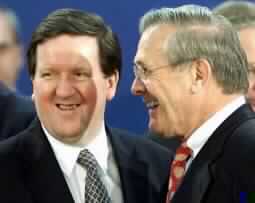NATO Reluctant to Pledge Cash to Counter New Terrorists' Threats
07/06/2002| IslamWeb
 HIGHLIGHTS: NATO Told Pre-emptive Action Required to Head Off Terrorist Biological Attacks||Simulation Exercise Shows Smallpox Could Spread to 25 U.S. States & 15 Other Countries Within 13 Days|| Yawning Capability Gap between the United States & Other NATO Members Raises Doubts About Alliance's Military Offensive Capabilities|| STORY: Western allies heard a chilling U.S. warning on Thursday of a growing threat of biological attack that required pre-emptive action and vowed to transform their forces to meet the post-September 11 threats.
HIGHLIGHTS: NATO Told Pre-emptive Action Required to Head Off Terrorist Biological Attacks||Simulation Exercise Shows Smallpox Could Spread to 25 U.S. States & 15 Other Countries Within 13 Days|| Yawning Capability Gap between the United States & Other NATO Members Raises Doubts About Alliance's Military Offensive Capabilities|| STORY: Western allies heard a chilling U.S. warning on Thursday of a growing threat of biological attack that required pre-emptive action and vowed to transform their forces to meet the post-September 11 threats.
U.S. Defense Secretary Donald Rumsfeld said his country and its 18 NATO allies could not wait for "absolute proof" before acting against terrorist groups and nations which he said were aggressively seeking nuclear, chemical and biological weapons.
The West must prepare to confront unknown threats as well as known dangers and that meant more defense spending, he asserted.
But European allies, under tight budget constraints, stopped short of agreeing to raise defense expenditure to counter dangers from terrorism and weapons of mass destruction. (Read photo caption)
U.S. officials gave ministers a classified briefing which one participant said included a stark account of the horrendous consequences of a possible smallpox attack on a U.S. city.
In a simulation exercise "Dark Winter" in which academics, senators and administration officials participated last year, smallpox spread within 13 days from Oklahoma City to 25 states and 15 foreign countries.
Rumsfeld said NATO faced a new security environment and political leaders would have to persuade the public to fund extra investments in new military capabilities.
MORE SPENDING?
NATO Secretary General George Robertson urged the ministers to spend more on military forces to ensure the alliance was able to respond to new threats wherever and whenever they emerged.
New French Defense Minister Michele Alliot-Marie said recently re-elected President Jacques Chirac had promised that France, not a member of NATO's integrated military structure, would raise military outlays in 2003-4.
But no other ally promised to match Washington by hiking defense budgets significantly.
The yawning capability gap between the United States and most European allies has raised doubts about whether the alliance will ever again be used to conduct a war.
NEW EQUIPMENT
The ministers committed themselves to draw up in time for a November NATO summit in Prague a catalog of new equipment they would acquire with fixed dates for delivery.
British Defense Secretary Geoff Hoon said the review would "release resources to take the fight to the terrorists."
Robertson said the Prague summit must be a watershed in efforts to ensure forces are properly organized and armed "even if that means additional resources for defense and security."
While Rumsfeld indicated the United States and allies might have to take pre-emptive action against potential unconventional threats, Robertson was more cautious, saying NATO was a defensive alliance and "we do not go out looking for problems to solve."
The ministers also instructed NATO's military staff to conduct a fundamental review of a military command structure that has changed little since the end of the Cold War.
The 19-nation alliance also held its first ministerial meeting with Russia since forging a new forum of equals for cooperation with its Cold War foe in Rome last week.
PHOTO CAPTION
NATO Secretary General George Robertson (L) and Defense Secretary Donald Rumsfeld smile before starting a defense ministers meeting at NATO headquarters in Brussels, June 6, 2002. NATO defense ministers pledged a radical transformation of their forces and command structures to meet new threats from terrorism and weapons of mass destruction. (Francois Lenoir/Reuters)
www.islamweb.net
